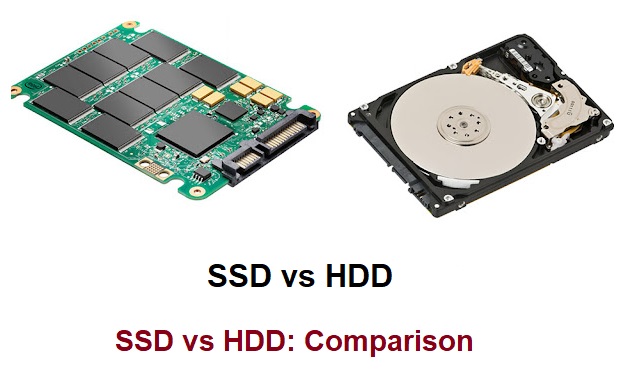They both SSDs and HDDs have the same functions and appear similar in terms of physical specs. Leha ho le joalo, they perform different tasks and each has its own distinct attributes. Ka poso ena, we’re going to look at two storage devices, solid-state drive (SSD) and traditional hard disk drive (HDD).
A sehloohong sena a, you will discover everything you need to know about SSD as well as HDD in regard to capacity, speed, price and longevity, joalo-joalo.
In this age of digital technology, it is a challenge to select the appropriate hardware to upgrade your laptop or computer or planning to buy a brand new one. This article will help choose the right one for you. Before we talk about the differences of SSD and HDD Let’s take an overview of the two types of storage.

Tse ka Hare
SSD vs HDD: Comparison
Let’s make a side by side comparisons that could aid you in determining the best option for your needs.
| Attribute | HDD | SSD |
|---|---|---|
| Full-Form | Hard Disk Drive | Solid State Drive |
| Components | The Moving Parts of Mechanical Equipment, e.g., arm. | Electronic Parts e.g., ICs. |
| Cost | Cheap | Expensive |
| Battery Consumption | High | Low |
| Speed | Below SSD | High |
| Capacity | Higher | Lower |
| Weight | Heavy | Light-weight |
| Boholo | Large | Compact |
| Data Transfer | Sequential | Random |
| Reliability | Less, because of mechanical components. | More durable Than HDD. |
| R/W Time | A higher percentage of R/W time. | Time for R/W that is shorter |
| Fragmentation Issue | Ho joalo | Che |
| Magnetism Effect | Highly susceptible to magnets with strong magnetic properties. | Nothing to worry about, and free of magnetism. |
| Latency | Higher | Shorter |
| Noise | Ho joalo, this is due to spinning. | No Noise |
| Vibration | A tiny rumble | No sound |
What is HDD?
HDD also known as Hard Disk Drive is a storage device for data that is comprised of magnetic tape and is composed of mechanical parts within. HDD depend on a spinning disk, or a platter coated with the magnetic coating for reading and writing data.
A read/write head mounted on an arm is suspended above the spinning platter, allowing access to the data. It is made up of a motor employed to rotate the disc as well as shift the arms. The faster the spin rate of the platter the faster the HDD writes and reads data.
The most common size of HDDs can be 2.5 inches in laptops as well as 3.5 inches to fit desktop computers. HDDs typically use the SATA (stands to mean ” Serial Advanced Technology Attachment,” kapa” Serial ATA“) segokahanyi.
What is SSD?
SSDs nearly perform the same capabilities as HDDs However, SSDs make use of interconnected flash memory chips to store information. The name itself suggests SSDs are solid-state drives, which means there aren’t any moving parts within SSDs.
With no spinning disk head, arm, or head, SSDs can go down to their shape and size which makes them more adaptable for devices with smaller capacities.
SSDs are also equipped with SATA ports as well as a 2.5-inch format, which means they are able to be used to replace HDDs. Ho phaella moo, there are smaller SSDs that come with miniature-SATA (mSATA) used in the miniand mini PCI (Peripheral Component Interconnect) Express slots.
Many laptops have SSD mounted in the PCI Express expansion slot or directly mounted onto the motherboard. These motherboard mounted SSDs make use of the form factor called M.2.
In addition There are new SSDs that use the NVMe (Non-Volatile Memory Express) interface that can offer the fastest SSDS read and write speed. Leha ho le joalo, NVMe is not the method to go. It could take a while to transfer servers from Data Centers to laptops for consumers.
The difference between HDD and SSD. HDD
Both storage devices have pros and drawbacks. The decision is based on the individual user the requirements of their budget. We’ve selected a few important aspects to explain the differences of SSD and HDD Let’s take a look:
SSD vs HDD: Theko
This is among the main distinctions among HDD as well as SSD. SSDs are more expensive in terms of gigabytes than conventional HDDs. SSDs that are based on SATA are more affordable than PCIe or M2 SSDs. SATA SSDs aren’t as expensive contrasted with a conventional hard drive.
Because SSDs utilize the latest technology, they’ll remain costly compared to the hard disk in the next few years, even after their cost has been reduced for a number of years.
SSD vs HDD: Capacity
When it comes to capacity in terms of capacity, a hard disk drive is not able to offer much advantages over solid-state drives due to they can provide plenty of space for lower cost. Empa, the extra physical space can be utilized to store terabytes of data.
Leha ho le joalo, SSDs are very expensive If you plan to buy greater than 1 TB. Empa, SSDs are much smaller when you purchase more than a few Terabytes. Leha ho le joalo, this is uncommon due to the cost.
SSD vs HDD: Reliability/Durability
In terms of the durability of SSDs, SSDs are said to be more robust. Because there aren’t moving parts, in the event that you fall on the laptop on your desk, then your files are much more safe.
HDDs however, in contrast, are more vulnerable to physical damage since they’re composed of mechanical components.
If you fall on or damage an HDD (or laptop), you’re most likely to damage data because of damaged HDD as well as physical damages. This is due to the fact that there is a good chance that all moving parts within the HDD might be impacted.
SSD vs HDD: Lifespan
Since every cell in flash memory is able to handle the restricted amount of write and read cycles and thus the life-span of HDDs is thought to be greater than SSDs.
Leha ho le joalo, this isn’t an issue today because of being able to use the TRIM Command technology. The technology is dynamically optimized to optimize the cycles of read and write.
In general the case, an SSD today will last for years before it fails and even if a person writes data to the disk for 24 hours in the same row. The majority of people upgrade the SSD in the hope to have more storage before the existing SSD becomes damaged or stops working.
SSD vs HDD: Speed
Speed is among the most important factors that differentiate SSDs and HDDs. Speed of a HDD is typically calculated based on the RPM (revolutions per minute). The more RPM is higher that is higher, the faster the HDD is able to perform.
Kajeno, HDDs typically spin at either 5400 le 7200 RPM on personal computers as well as laptops. Leha ho le joalo, some servers-based platters can spin at 15000 RPM. The majority of drives with 5400 RPM are capable of delivering speeds of 100 MB/s. 7200 RPM could go up to 150 MB/s.
Since there aren’t platters or moving parts in SSDs, their speed is measured in MB/s. SSDs can be measured as MB/s.
Most often the case, an SSD built on SATA can reach speeds of as high as 550 MB/s which is three times more than an ordinary HDD. Ho phaella moo, the speed average for M.2/PCIe SSDs is as high as 2.2 GB/s. This means that SSDs are much more efficient than HDDs.
SSD vs HDD: Gaming
If the computer drives have faster read and write speeds, gaming improves, making SSDs more suited to accessibility to gaming. Games can hold a large amount of data because they’re composed of components like high-resolution audio, textures models, characters and much more. The data is loaded in small chunks or as required.
Ka tloaelo ho, games that take about three to four hours to download on an HDD could take as little as about one or 2 minutes to load on an SSD. In other words, SSDs are game-changers.
SSD vs HDD: Noise
Since there are moving parts within the HDD It makes minimal noise when it is in use. The more quickly the platter rotates within the HDD it produces, the more noise it generates. Ho phaella moo, SSDs make no noise because they don’t have moving components. SSDs aren’t mechanical.
SSD vs HDD: Power Consumption
HDDs require more power than SSDs. It’s because there are moving parts within the HDDs like a platter that require energy to move its self from an inactive state. Ka hona, the energy used by HDDs can also be wasted through noise or friction.
SSDs have a high energy efficiency and give you more battery life while working on your tablet or laptop.
SSD vs HDD: Other Consideration
There are a lot of other aspects to take into consideration before deciding the best option for you. Mohlala, because SSDs do not contain moving components, they are more sturdy.
There isn’t a problem with fragmentation when using SSDs because they can write data anywhere, without any the risk of. Because of Random Access, SSDs have a phenomenal speed in comparison with an HDD.
While SSDs are more powerful, faster and more efficient in energy use, HDDs are more affordable because of their price, particularly when it comes down to capacity.






